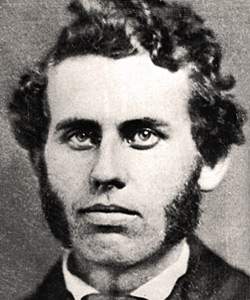John Thomson Ford (National Cyclopaedia)
Reference
FORD, John Thomson, theatrical manager, was born in Baltimore, Md., Apr. 16, 1829. His family were early settlers of Maryland; some of them took part in the revolutionary war, and six were among the defenders of Baltimore in 1814. From 1844-50 Mr. Ford was in Richmond, in his uncle's (William Greaner's) tobacco factory, afterward known as “Castle Thunder.” Beginning his career at twenty-one years of age as business manager and advertiser of a concert company, with which he traveled through the United States and Canada, he, in 1854, assumed control of the Holliday street theatre in Baltimore. This he managed for twenty-five years, rebuilding it when it was burned in 1873. The building, in the city of Washington, which gained an unhappy notoriety as the scene of the assassination of President Lincoln, was one of three which he erected at different times in that city; besides these, he built two in Baltimore, one in Alexandria, Va., and managed a number in southern cities, besides, at times, two in Philadelphia. Mr. Blaine, then U. S. senator, spoke of Mr. Ford at the McCullough banquet as “my friend Ford, who has managed so well some theatres north of Mason and Dixon's line, and all of them south of it.” Mr. Ford has had intimate business and personal relations with many distinguished persons on and off the stage: from Forrest and the elder Booth, Charles Kean and Charlotte Cushman to Edwin Booth, Joseph Jefferson, and Mary Anderson – his management having covered half a century. He entertained Dickens and the Emperor Dom Pedro, while they were visiting Baltimore. As a citizen of Baltimore, he has been active, prominent, and useful, having served as president of the city council (1857-58), and acting mayor. He aided and promoted the establishment of its great parks, its paid fire department, the fire alarm telegraph system, the new water works, and the new city hall. He has been president of the Union Railroad Co., of a banking and savings institution, of the society organized to give free summer excursions to the poor, and of the board of directors of the Baltimore and Ohio railroad, and for twenty-five years one of the board of governors of the Maryland penitentiary. He is now a member of the Board of Trade, and vice president of the West Baltimore Improvement Association, and of the Humphrey Moore Institute. He has several times been selected as arbitrator in very important disputes. In a railroad matter, in which heavy interests were involved, he accomplished the unusual feat of representing and satisfying both parties. He has written much for papers and magazines, including a series of articles on English comedy in the Baltimore “Sun,” and one on the murder of Lincoln in the “North American Review.” He now owns Ford's Grand Opera House in Baltimore, which he erected in 1871. He died in Baltimore, Md., March 14, 1894.
"Ford, John Thomson,"The National Cyclopaedia of American Biography (New York: James T. White & Company, 1898), 1: 242.



